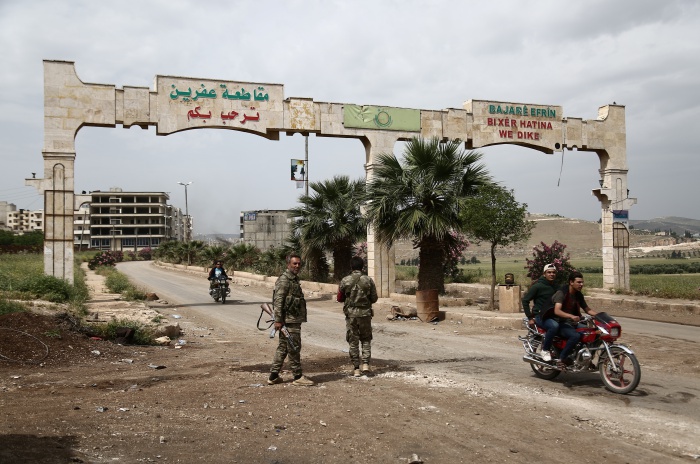A new in-depth investigation by Amnesty International released on Thursday reveals that residents in Afrin, a town in northern Syria, are enduring a wide range of human rights abuses and violations, mostly at the hands of armed Syrian groups that have been equipped and armed by Turkey.
These violations include arbitrary detentions, enforced disappearances and confiscation of property and looting to which Turkey’s armed forces have turned a blind eye. Some of these groups, and the Turkish armed forces themselves, also have taken over schools, disrupting the education of thousands of children.
“Turkey’s military offensive and occupation have exacerbated the suffering of Afrin residents, who have already endured years of bloody conflict. We heard appalling stories of people being detained, tortured or forcibly disappeared by Syrian armed groups, who continue to wreak havoc on civilians, unchecked by Turkish forces,” said Lynn Maalouf, Amnesty International’s Middle East research director.
“Turkey is the occupying power in Afrin, and therefore is responsible for the welfare of the civilian population and maintaining law and order. So far, its armed forces have failed utterly in these duties. It cannot evade responsibility by using Syrian armed groups to carry out its dirty work. Without further delay, Turkey must end violations by pro-Turkish armed groups, hold perpetrators accountable, and commit to helping Afrin residents rebuild their lives.”
In January 2018, Turkey and allied Syrian armed groups launched a military offensive against the People’s Protection Units (YPG), the military force of the autonomous administration led by the Syrian Kurd Democratic Union Party (PYD). Three months later, Turkey and its allied forces seized control of Afrin and its surrounding areas, forcibly displacing thousands of people who fled and sought safety in the nearby al-Shahba region where they are now living in dire conditions.
According to several residents in Afrin, Turkey’s armed forces have a significant presence in the center of the city and in several surrounding villages. On 1 July, Turkey’s Ministry of Foreign Affairs stated that its armed forces would stay in Afrin to continue working on the development of the area.
Between May and July 2018 Amnesty International interviewed 32 people, some of whom were still living in Afrin and others who had fled to other countries or different areas of Syria. Interviewees named pro-Turkey armed groups including Ferqa 55, Jabha al-Shamiye, Faylaq al-Sham, Sultan Mourad, and Ahrar al-Sharqiye as responsible for serious human rights violations.
Amnesty International interviewed several residents and internally displaced people who reported that armed groups had arbitrarily detained civilians for ransom as punishment for asking to reclaim their property, or on baseless accusations of affiliation with the the PYD or YPG. Local sources told Amnesty of at least 86 instances of arbitrary detention, torture and enforced disappearance.
Since March 2018, when Turkey and allied armed groups seized control of Afrin, hundreds of people have been returning to the city by foot through a mountainous route, as the YPG has blocked the official routes into the city, deliberately preventing displaced people from returning to Afrin. Many of those who managed to return found that their properties had been confiscated and their possessions stolen by armed groups allied with Turkey.
In April 2018, a representative of the military court claimed in a media interview that there had been looting incidents during the military operation, by both armed members and civilians, but that the court had begun to return the belongings to their owners. The court representative explained that, in coordination with the military police in Azaz and Turkey’s armed forces, the individuals responsible for the looting had been arrested and referred to court.
Since January 2018, access to education has been nearly impossible for people in Afrin. Residents told Amnesty International that since March, children had been able to access only one school in Afrin city, while Afrin University has been completely shut down after it was destroyed and looted. According to former teachers displaced to the al-Shahba region, Turkish forces, alongside allied Syrian armed groups, are using Amir Ghabari School in Afrin as military headquarters.
According to local media sources and residents, Turkish forces and the armed groups converted the public school in Shara to a police headquarters in June 2018. Turkish forces are also using another school in Jenderes as a field hospital, according to residents.
Following the offensive in January 2018, thousands of people fled to the nearby al-Shahba region. At least 140,000 people are now living in camps or damaged houses without proper access to services, especially medical care. The injured and chronically ill have to wait for government permission to be allowed access into Aleppo city, the nearest place where they can receive adequate medical care.
The Syrian government has also prevented any movement from the al-Shahba region to other parts of Syria that enjoy better living conditions. Furthermore, the YPG has blocked the roads from the al-Shahba region to Afrin, deliberately preventing displaced people from returning to their homes.


